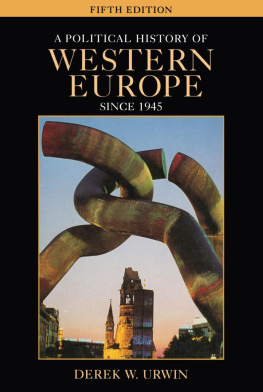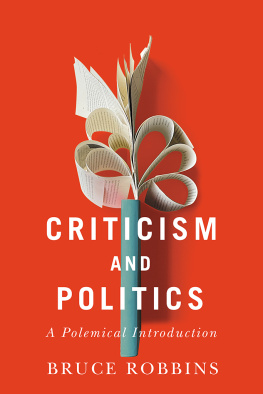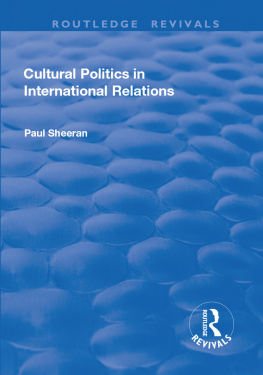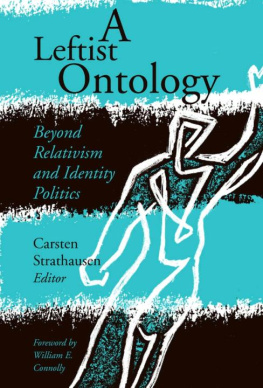Cultural Relativism and International Politics
Cultural Relativism and International Politics
SAGE Publications Ltd
1 Olivers Yard
55 City Road
London EC1Y 1SP
SAGE Publications Inc.
2455 Teller Road
Thousand Oaks, California 91320
SAGE Publications India Pvt Ltd
B 1/I 1 Mohan Cooperative Industrial Area
Mathura Road
New Delhi 110 044
SAGE Publications Asia-Pacific Pte Ltd
3 Church Street
#10-04 Samsung Hub
Singapore 049483
Derek Robbins 2015
First published 2015
Apart from any fair dealing for the purposes of research or private study, or criticism or review, as permitted under the Copyright, Designs and Patents Act, 1988, this publication may be reproduced, stored or transmitted in any form, or by any means, only with the prior permission in writing of the publishers, or in the case of reprographic reproduction, in accordance with the terms of licences issued by the Copyright Licensing Agency. Enquiries concerning reproduction outside those terms should be sent to the publishers.
Library of Congress Control Number: 2014954625
British Library Cataloguing in Publication data
A catalogue record for this book is available from the British Library
ISBN 978-1-4739-0781-2
eISBN 978-1-4739-1096-6
Editor: Chris Rojek
Assistant editor: Gemma Shields
Production editor: Vanessa Harwood
Marketing manager: Michael Ainsley
Cover design: Jen Crisp
Typeset by: C&M Digitals (P) Ltd, Chennai, India
Printed and bound by CPI Group (UK), Croydon, CR0 4YY (for Anthony Rowe)
For Diana
About the Author
Derek Robbinsis Emeritus Professor of International Social Theory in the School of Social Sciences at the University of East London. He is the author of
The Work of Pierre Bourdieu (Open University Press, 1991),
Bourdieu and Culture (Sage, 2000),
On Bourdieu, Education and Society (Bardwell Press, 2006) and
French Post-War Social Theory: International Knowledge Transfer (Sage, 2011); the editor of two 4-volume collections of articles on Bourdieu in the Sage Masters of Contemporary Social Thought series (2000, 2005) and of a 3-volume collection of articles on Lyotard in the same series (2004). He has also published many articles and book chapters on the work of Bourdieu. He edited and introduced Jean-Claude Passerons
Sociological Reasoning, published by Bardwell Press in March, 2013. He is editing and contributing to the volume on Bourdieu in the Anthem Companions to Sociology series, scheduled for publication in 2015, and he is currently writing
Bourdieu and Social constructionism (provisional title) for publication by Manchester University Press.
Acknowledgements
I gave my professorial inaugural lecture as Professor of International Social Theory in 2002, just a few months after Bourdieus death. The title was Finding Reasons for Maxims: Social Science and International Relations. The quote is from Montesquieus Preface to De lesprit des lois. I outlined my intention to try to pursue the implications of Bourdieus work for the analysis of international relations. This was the commencement of the orientation which finds fruition in this book. In the intervening period, I had the good fortune to work with Dominique Merlli of the Centre de sociologie europenne on a Franco-British project on the trans-national reception of the work of Lvy-Bruhl, and I have also benefited from the opportunities to explore in detail the work of Durkheim and Lvy-Bruhl provided by the Centre for Durkheimian Studies at the University of Oxford. I am particularly indebted to Willie Watts Miller and Bill Pickering, both of whom encouraged me to explore the nature of Bourdieus indebtedness to these predecessors. Since the death of Bourdieu, to whom I owe so much intellectually, it has been a great bonus to me to meet Jean-Claude Passeron and to have conversations which have helped me to understand better the issues at stake in the development of social science in France in the 1960s and beyond, with particular reference to the influence of Raymond Aron. Jean-Louis Fabiani was also a great support when I had the opportunity to try out some of my ideas about the trans-national transfer between France and Britain of philosophy and social science in the 19th century as a Directeur associ at the cole des Hautes tudes en Sciences Sociales, Paris and Marseille, in 20089. I have most recently, in 2014, had the opportunity to talk at an international conference on Modernity: Culture Tradition and Morality Reconstruction in Shanghai at the invitation of Professor Gao, and some of the ideas presented there are developed further in the second half of the book. I am grateful to him for his invitation and for Dr Yang Yang of the University of Cambridge and Shanghai Jiao Tong University, for facilitating the visit.
My greatest debt is to Chris Rojek, who has encouraged me in my work for almost 20 years. I am grateful to him for the opportunity to write this book.
Introduction
There appear to be two conflicting discourses in operation currently in respect of world affairs and global politics. On the one hand, western media conceptualize events by reference to international law and international human rights on the assumption that these conceptualizations have universal validity and with a view, through their mediation, to securing global acquiescence in a world view developed historically within the particular context of Europe. For most national politicians who aspire to be influential internationally in summits and state visits it has become a sine qua non to speak in conformity with this discourse, which contributes to the constitution of an epistemic community of diplomats and media reporters. On the other hand, there is an enormous interest in cultural difference. What once were the dry-as-dust subjects of archaeology and anthropology are enjoying a renaissance as they now provide information which attempts to satisfy the seemingly insatiable need, evidenced in tourism and museum attendance, for us to define our current cultural identities by reference to the supposedly similar or dissimilar life experiences of peoples living in prehistoric times, in ancient civilizations, or in remote regions of our present world. The conflict between these discourses is, perhaps, more apparent than actual. There is an increasing tendency for the recognition of cultural difference to be appropriated in the tacit pursuit of assimilation to a uniform view of what it means to be human. Anachronistic conceptualization has, perversely, become the stock-in-trade of historical analysts, as evidenced by the required deployment of the present tense in conversing about the past.














